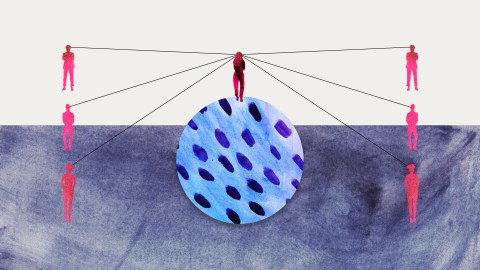How saying “me” or “we” changes your psychological response — and the response of other people

- The capacity to shift away from one's own perspective is embedded in the structure of natural language and flexibly deployed at an early age. Children are not fundamentally egocentric.
- Everyday pronoun shifts convey implicit messages with the potential to foster virtuous character traits.
- The experiences that are common across individuals are judged to be the most meaningful and resonant. Highlighting commonalities is especially effective in teaching children rules and norms.
What comes to mind when you think about three little words: I, you, and we? Likely you don’t give them any thought at all — or if you do, you might assume they are simply a way to mark who is speaking at any given moment. But we have discovered that these “little words” can carry a big punch: They convey a host of implicit messages that enable people to move beyond their own perspective to imagine how someone else would think or feel.
The words we choose give humans the flexibility of either focusing inward on the self (“I always make mistakes”) or adopting a broader, more inclusive perspective (“We all make mistakes”). Whenever you express your own thoughts, beliefs, and insights, you are making a choice by virtue of the words that you use, often without even realizing it. In this way, human languages provide a relatively effortless mechanism for reframing experience from personal and isolated, to general and shared with others. In contrast to deliberately shifting perspective when instructed to do so (an effortful task that is often difficult to achieve), shifting perspective by pronoun shifts is intrinsic to the structure of human languages, highly practiced, and entrenched in everyday conversation.
Over the last few years, I have been collaborating with Drs. Ariana Orvell and Ethan Kross to study how people engage in these pronoun shifts and what consequences they have for psychological functioning. We have discovered that broadening one’s perspective via pronoun choices has impacts for children as well as adults. Pronoun shifts are used to make meaning out of difficult experiences, to create resonance with others, and to convey kindness, compassion, and the right way to behave.
Making meaning
All you can do in life is move forward, you can’t get the moment back, you can’t get the opportunities back, you can’t go back in time, and you just learn from it.
— Odell Beckham, December 30, 2015
In the quote above, the football player Odell Beckham reflected on an embarrassing error he made on the football field, by stepping back from his own self-perspective and drawing a set of broader lessons. He did so by using the word “you” — not to mean the reporter he was speaking to, but rather to people in general — that is, anyone or everyone.
My collaborators and I have found that when people are asked to make meaning out of a difficult experience, they likewise often reframe a personal experience into one that applies more generally, using those little words “you” (meaning “one” or “anyone”) or “we.” When people were asked to write about a recent personal experience, they often spontaneously shifted from relaying the specifics of their experiences (for example, an argument with a spouse or a friend making bad choices) to drawing more general life lessons (“You can actually learn a lot from others who see things differently than you”; “Sometimes people don’t change, and you have to recognize that you cannot save them”).
People were more likely to shift to a general perspective when asked to write about a negative experience than a neutral experience, and were also much more likely to do so when asked to make meaning out of a negative experience than when asked to simply relive that experience. Shifting perspective in this manner helped people distance themselves from the negative event, decrease their negative emotions, and increase their feeling of closure.
Young children can engage in these perspective shifts as well. In one study, we told children (4-10 years of age) short stories about a character who experienced a challenging event, such as being excluded from a game, and asked them what the character had learned. Like adults, children spontaneously shifted to a generalized perspective, talking about lessons that applied to people more generally: “You should be kind to one another,” or “You can’t play with people all the time and you have to make new friends,” or “Sometimes people won’t let you play.”
Creating resonance with others
“You can’t teach an old dog new tricks.”
“You win some, you lose some.”
“You only live once.”
— Anonymous proverbs
Generalizing pronouns also fosters resonance — a sense that an idea is personally meaningful and “speaks to” the person who hears it. It is no coincidence that proverbs — those timeless truths, passed down from one generation to the next — commonly employ “you” (in the sense of “people in general”). If researchers replace the “you” in a proverb with “I,” people rate it as significantly less resonant, showing that the pronoun itself plays an important role.
Interestingly, the same sense of connection is found when looking at people’s responses when reading fiction. We crunched the numbers from publicly available data that tracked which passages people highlighted when reading popular novels on their e-reader devices. We discovered that the most commonly highlighted passages were nearly ten times more likely to contain generalizing “you” than unhighlighted passages, and nearly five times more likely to contain “we” than were unhighlighted passages. Examples of these resonant passages included: “Home is the place that’ll catch you when you fall”; “Sometimes when you like where you end up, you don’t care how you got there”; and “But sometimes the hardest things in the world to see are the ones that are right up on you.”
Conveying kindness, compassion, and the right way to behave
“A pandemic drives home the essential interconnectedness of our human family… We are in this together — and we will get through this, together.”
— UN Secretary-General António Guterres, March 13, 2020
Talking about a challenging event with generalizing pronouns is a way of expressing kindness and compassion by acknowledging that life can be hard, but we’re all in this together. In my lab, we have tested this idea by providing children and adults with short stories involving a character who experienced a minor mishap, and a teacher who commented on the event with either specific or generalizing language.
For example, in one story, a girl named Sam was running around the playground, then slipped and dropped her special stickers in a big mud puddle. Another child told the teacher what happened, and then the teacher responded by either focusing specifically on Sam (“Sometimes Sam drops things and she gets them yucky”) or reframing by making a more general observation about people in general (“Sometimes we drop things and we get them yucky” or “Sometimes you drop things and you get them yucky”). When the teacher reframed the event by broadening the perspective, both children and adults judged the teacher as kinder, more tolerant of mistakes, and more likely to help the child out by rectifying the mishap (for example, replacing the ruined items). Instead of blaming Sam, the teacher made use of generalizing “you” or “we” to communicate that her behavior was normal, OK, and something that others do as well.
Generalizing pronouns are likewise an effective way of communicating appropriate rules of behavior, ranging from moral duties (“We need to help those in need”) to social conventions (“You drive on the right side of the road”).
Broader lessons
Everyday pronoun shifts are a tool for transcending one’s individual perspective. This is a striking result, given that considering perspectives other than our own can be a challenge at any age — as can be seen by everything from lovers’ quarrels to political polarization to outright war. Perspective-taking is especially difficult for children, who often assume that others perceive the world just as they do.
For example, if two children were to stand at opposite ends of a crowded room, each one would likely think that the other sees what they themselves see. Deliberately shifting one’s perspective is effortful and recruits brain systems that take years to develop. And even for well-meaning adults who are explicitly asked what someone else would see or think, research shows that their own personal perspective is primary. People rely on their own perspective as a starting point and have to make corrective adjustments to take into account another person’s point of view.
And yet in striking contrast to these difficulties, the capacity to shift perspectives is woven into the fabric of natural language. Pronouns convey implicit messages that allow us to make meaning out of painful experiences, increase our compassion for others, and effectively transmit proper rules of behavior. That these devices are built into the architecture of human language suggests that taking on the perspectives of others is a foundational aspect of our species.





